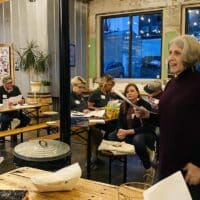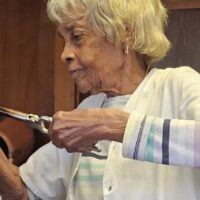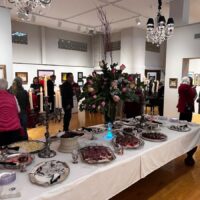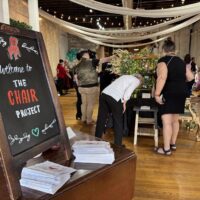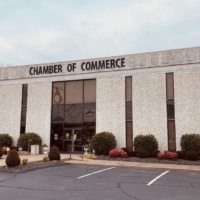At 17, I was the Santa Claus for the Walkertown section of Hazard. Rick Rosanova, the news guy at Channel 4, was Santa at the new Sears in the old bowling alley in another part of town, Lothair. And Bill Douglas was the city’s main Santa from Backwoods to Big Bottom. He had a $1,000 velvet Santa outfit (in 1968 dollars) with black calfskin boots and jingle bells on a leather strap. His fake beard was combed human hair and in addition to that he could play the harmonica and jig dance. Value add-ons at anyone’s Christmas party.
I worked at Palmer’s House of Toys, a more humble operation. I had a belly pillow and a stringy white beard-wig combination that I had to enhance by putting white shoe polish on my sideburns so my hair would not show through the gaps. The outfit was thin red corduroy, and instead of boots I had plastic covers to slip over my shoes to affect an illusion of boots.
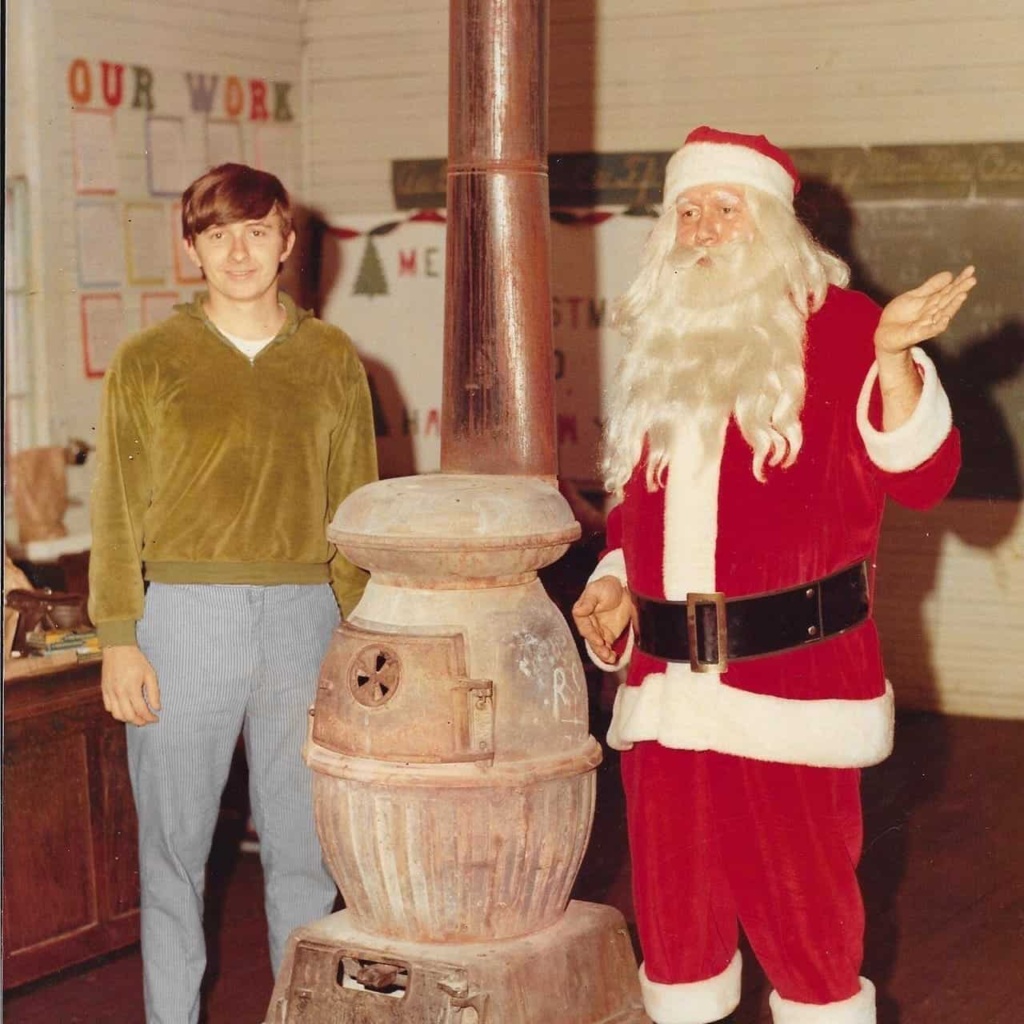
Palmer’s House of Toys was owned by Evangeline “Dang” Palmer who had been my speech and drama teacher until she got fired for telling Merrill Pelfrey he did not know his own name. “If it is M-e-r-r-i-l-l, it’s pronounced Mehr-rill. “
Mehr-rill who thought his name was Merle said, “Dammit, woman I reckon I know my own name. It ain’t Mehh-rul, it’s Murl.” She kicked him out of her class, which was just home room for 10 minutes a day, but she drew that line unrepentantly and would not let him back in even when the order came down. So the school canned her. She went straight out and bought Country Boy Feltner’s furniture store, and then just before Thanksgiving she rented the upstairs above the old Pet Dairy across the street. Filled it with toy bins. Hired me.
Sadly, and this is no longer part of the story, Merrill Pelfrey ended up doing jail time for something like wanton endangerment. A couple of years later the Hazard cops were following him as he walked home from the Brown Derby, a bar below the new Sears in Lothair. He was tipsy and thought they were getting right up against him with the cruiser just to mess him up. When he got to his house, he grabbed a shotgun, blasted out their tires, and put 320 holes in the vehicle (according to the following week’s Hazard Herald). At first they had him up for attempted murder, but eventually let him plead it down. He told me he wasn’t attempting anything, he was looking right at the cops and could have shot them boys anytime, if he had wanted to.
Mrs. Palmer came from Central Kentucky, horse country, and more refinement. She had studied drama at Northwestern and was a classmate there of Charlton Heston (Ben Hur, El Cid, Planet of the Apes, Soylent Green is people), a fact she found reason to mention in class at least once a week. It was a time when smart women often taught school instead of being lawyers or doctors. And Mrs. Palmer was very smart. She knew all the Greek plays by heart, the eye-gouging kings who marry their mothers and mommas who kill their babies to keep them from the clutches of trifling husbands. She would tell us the plots with broad theatrical gestures. It was as good as school gets. She talked all and time and there was never a test.
Besides recalling encounters with Charlton Heston, she would regale us with tales of her performances at Pioneer Playhouse in Danville, Kentucky (Lizzie and the Rainman, Arsenic and Old Lace), and the backstage dramas in which she always seemed to triumph. We were graded on how dramatically we could read aloud, how well we could make up speeches, and for helping with the school plays that she would direct like On Borrowed Time or Wait Until Dark. Speech class had only one overriding rule, and that was you couldn’t pronounce your long “i’s” flat like you would naturally in Hazard. You had to make them sound like you were saying “aye, aye, Captain Bligh.” If you didn’t, she claimed she would fail you. Not my problem. I was good at speech. Sometimes she would tell me to stand up in class and say America.
I’d say, “America.”
She’d pause for a second, “Say America.”
Again, I’d say “America,” sounding it out like she and Charlton Heston would.
Then she’d say, “He has a beautiful voice, doesn’t he?” All followed by a chortle from the back of her throat, a sound like spit frying on a griddle that you can never unhear.
After school my friends would make fun, “Say America for me.” But then it was me she hired as Santa. Paid good money, maybe two bucks an hour, and the work was nothing, if you could belt out an imitative Merry Christmas and a Ho-Ho-Ho.
Often the store was empty, and I would play with the toys myself, racecars and gyroscopes. Other times high school friends would come by to harass me, the boys trying to get me to say something inappropriate around the kids, teenage girls who wanted to sit in my lap, whisper in my ear, and make me squirm. Occasionally a kid would get scared, tear up, run back to his minder, but if you’d let the little fellow find his own way to you, he’d generally work up some courage, get a wish in, and go home hopeful. The kids that shopped in Walkertown didn’t want that much, and the House of Toys was not high end. Mostly they said dolls and balls, toy guns and play kitchens. Sometimes boys wanted those little gas stations with an elevator for the cars to get up to the down ramp. Not fancy or electric.
Then one Wednesday I got a call to come in that night to be Santa when we were not open. I remember that I did not want to bother with shoe polish on the sideburns. Too much to scrub out later on a school night. When I got there, Mrs. Palmer explained that there was this kid, I want to say Lucas or James, but I don’t remember, 7 or 8, and he was sick. I think it was leukemia then before all the miracle cures. His parents called Mrs. Palmer. Christmas was two weeks out, but they did not think he would make it. They told her they had taken him to Lothair to see Rosanova’s Santa, and downtown to see Bill Douglas, but after each visit he had told his folks, “That’s not the real Santa Claus.”
I went across the street, up the metal stairs, and turned on the lights to get dressed. I pressed the white beard and wig against my temples to hide my scraggly facial hair. Santa’s throne was an unsold upholstered chair in the back of the store. When they came up I could peer out over the bins and watch him see me as he began to make his own way back. Mrs. Palmer, who rarely came up the steps, was with them, the mom and the dad, and I think someone else from the family. Mrs. Palmer was a doctor’s widow. She had money. She was the kind of woman who would buy a furniture store just to show the school system that she did not need their payday or their approval. She would have given James or Isaac or Lucas every toy on display and not blinked. She told him to pick what he wanted.
The mom trailed the slight, sandy-haired boy. He was ashen. She wasn’t that much older than me. Her face was puffy from crying but also from holding it back. Her head cocked like when you’re worn down. She smiled at him with absolute pride, like watching your kid sing in the school pageant. But it was as if she was mourning him at the same time.
I met him in the bins, reached in to the toys, and handed him a rev-up top with a gyroscope inside it. I think it was yellow and cost four ninety-five. I called him by his name and whisked him up into my chair. I talked in softer Santa, asking him what he wanted and making a deep quiet Ho-Ho trying to sound like a man. He told me about his little brother and his momma, his daddy. If he wanted something for Christmas, it was not a big part of our conversation. I just remember that when he got up to go, the top he’d been holding had slipped into the side of the chair. As he walked back to his mom, I said, “Here, Lucas, don’t forget your top.” And he looked at me and said “I won’t, and I won’t forget who gave it to me either.”
We did not have a school play that year. Mrs. Palmer directed some community theater after that, and I got cast a couple of times: once as a farmer in the bi-centennial history of Hazard, another time as Vinnie, one of the poker players in The Odd Couple. No small parts, only small actors. The kid made it through Christmas, but not into spring. Rosanova moved away owing a lot of merchants money. And Bill Douglas is remembered in town as the greatest Santa of all time.
Dee Davis is president of the Center for Rural Strategies and publisher of The Daily Yonder, a nonprofit newsroom that provides news, commentary and analysis about and for rural America. It is the news platform for the Center for Rural Strategies, which has offices in Whitesburg, Kentucky, and Knoxville, Tennessee. Davis is on twitter @iamflyrock.

